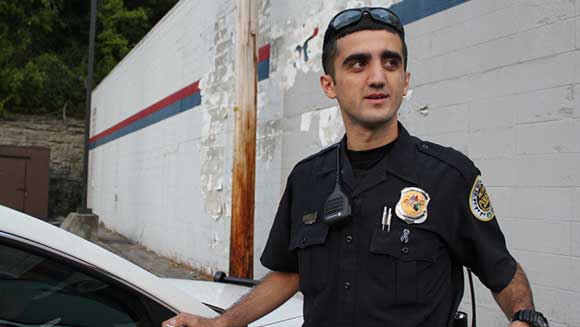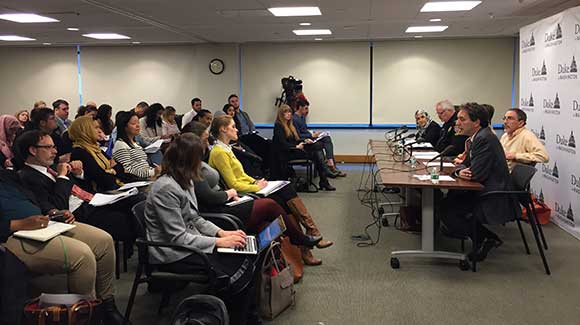
Jiyayi Suleyman is Muslim and the first Kurdish-American policeman in Nashville, Tenn. Photo creditor © Monica Campbell
The U.S. strategy to prevent homegrown violent extremism through community policing holds promise, but faces significant challenges and needs reforms, according to a new report from the Triangle Center on Terrorism and Homeland Security at Duke University.
Community policing strategies promote collaboration between police and communities to solve problems that undermine public safety. Such strategies could help prevent violent extremism but are being employed by less than half of police agencies, the report states.
The report recommends expanding community policing efforts and making them entirely separate from police counterterrorism intelligence collection and criminal investigations.
“One of the best ways to prevent violent extremist attacks is for the police to develop trusted and deep relationships with the communities they serve,” said the report’s lead author David Schanzer, associate professor at Duke’s Sanford School of Public Policy and director of the center.
“Once trust is established, communities can work with police to build resilience against extremism and identify threats to public safety.”
However, building trust with Muslim-Americans has become especially challenging. Muslim-Americans interviewed for the report said they have suffered widespread discrimination and harassment since 9/11 that has increased with the rise of ISIS. They resent that police terrorism prevention efforts appear to be directed only at Muslims and are suspicious of police intentions, the study finds.

Researchers present the report on law enforcement programs countering violent extremism Thursday in the Duke in DC office.
The report, “The Challenge and Promise of Using Community Policing to Prevent Violent Extremism,” assesses the Obama administration’s national strategy for using community policing approaches to prevent violent extremism.
The findings are based on a survey of law enforcement agencies, as well as hundreds of hours of interviews with police departments and community members in eight cities. The report is sponsored by the National Institute of Justice, the research arm of the U.S. Department of Justice. It includes recommendations for the federal government, for police agencies and for Muslim-American communities.
“Community members are natural allies for law enforcement, if they are approached in a consistent, nondiscriminatory way,” said co-author Charles Kurzman, professor of sociology at the University of North Carolina at Chapel Hill. “To reduce the perception of discrimination, and to prevent violent extremism across the board, law enforcement should consider outreach initiatives for all communities that are being recruited for violent extremism, not just Muslim communities.”
Although preventing violent extremism is a pressing national issue, it is not a top priority for local police who must also address violent crime, drugs, gangs and other public safety concerns with limited budgets, the authors found. Most agencies do not have a full-time officer dedicated to community engagement.
“Our research shows that the most effective way for police departments to build strong relationships is through a holistic outreach program that focuses on all of the subsets of the community they serve, not just a particular group, and the entire range of public safety issues, not just violent extremism,” said co-author Jessica Toliver, director of technical assistance for the Police Executive Research Forum.
The recommendations include:
• Separate community outreach and engagement programs from police units that collect intelligence and conduct criminal investigations. Police officers cannot expect to be welcomed to community events and be considered a partner in addressing public safety concerns if the same officers are collecting information that is fed to criminal investigators, the authors state.
• Police agencies should recruit and hire a workforce that reflects the racial, ethnic and religious composition of their community.
• The federal government should provide long-term funding directly to police departments to support outreach and engagement personnel.
• The federal government should redouble efforts to prevent discriminatory treatment, profiling and harassment of law-abiding citizens at airports and immigration checkpoints.
• The federal government’s “Countering Violent Extremism” terminology, adopted in 2011, is disliked by both police departments and communities and should be abandoned. As an alternative, the report authors suggest the term COMPLETE Public Safety (Community Partnerships with Law Enforcement to Enhance Public Safety).
• Muslim-Americans should work with the police to help community members learn how to identify and report potential criminal conduct to law enforcement.
Below, David Schanzer talks with members of the audience following the report presentation. Photos by Alyssa Dack
